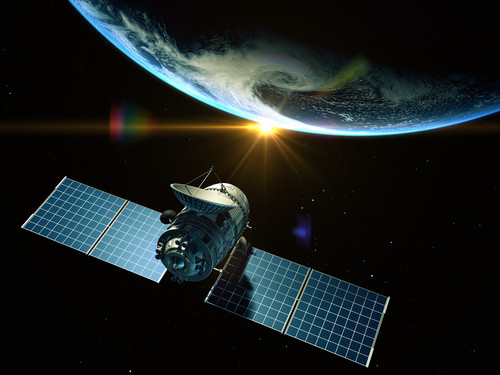Popular Reads
Top Results
Can't find what you're looking for?
View all search resultsPopular Reads
Top Results
Can't find what you're looking for?
View all search resultsRI to delay satellite launch, cites COVID-19 disruption
“COVID-19 has affected Satria’s procurement and production,” Communications and Information Minister Johnny G. Plate said during a press briefing on Monday, calling the disruption a “force majeure.”
Change text size
Gift Premium Articles
to Anyone
T
he government has forecast a delay in the launch of the country’s biggest telecommunication satellite, Satellite of the Republic of Indonesia (Satria), to the fourth quarter of 2023, from the planned launch in March 2023, due to disruptions caused by the COVID-19 pandemic.
“COVID-19 has affected Satria’s procurement and production,” Communications and Information Minister Johnny G. Plate said during a press briefing on Monday, calling the disruption a “force majeure.”
As a consequence of the projected delay, the government has requested the International Telecommunication Union (ITU) to give a 14-month deadline extension for Satria to use its assigned 146°E orbital slot, located around Papua Island, by 2023. ITU can grant another country use of the position should Indonesia fail to fill the slot in time.
However, the ITU is still in discussion to grant the request, while in the meantime, requiring the lead contractor and operator of the project, PT Pasifik Satelit Nusantara (PSN) consortium, to provide more information about the cause of the delay, according to Johnny.
The government has also prepared a plan in case there is even a longer delay in the satellite launch, Johnny said. It has prepared to either put in a satellite floater – a ready to launch space object, to secure the 146°E orbital position until Satria is ready to launch, or to move the location of the satellite to other available slots, a practice known as backup filling.
The satellite, with an estimated investment of US$550 million, is envisioned to boost connectivity inclusion in the country upon its launch, providing free internet to 150,000 public facilities, including schools, regional government offices and health facilities.
The latest Indonesian Internet Providers Association (APJII) survey shows that the country’s internet penetration rate rose to 73.7 percent in 2019 from 64.8 percent in 2018.
Despite its large number of internet users, Indonesia’s internet penetration rate remained at 64 percent in January, according to DataReportal, lagging behind neighboring Brunei, Singapore and Thailand, where internet penetration rates exceed 70 percent.
Earlier in September, the Indonesian consortium PSN, represented by satellite provider PT Satelit Nusantara Tiga, signed a preparatory work agreement with French-Italian aerospace manufacturer Thales Alenia Space (TAS) to kick off the project.
Satria will have a throughput capacity of 150 billion bits per second (Gbps), three times the capacity of the nine telecommunication satellites that Indonesia currently uses, according to the minister at the time.
Meanwhile, despite the setback, Johnny said the project’s funding, through a public-private partnership (PPP) scheme, is still on track. French public investment bank Bprifrance and China-backed development bank Asian Infrastructure Investment Bank (AIIB) have prepared the depositors, while PSN has also provided the equity funding, he added.
Read also: RI takes giant leap forward in $550m 'Satria' satellite project
According to PSN president director Adi Rahman Adiwoso in a press conference in September, the project cost will be funded through a mixture of export credit from France and China at $425 million, and equity of $125 million.
Export credits are government financial support, direct financing, guarantees, insurance, or interest rate support provided to foreign buyers to assist in the financing of a purchase.
“Satria’s manufacturing process has begun and I can say that we are progressing normally, and the project is developing well,” Johnny said.
Meanwhile, Indonesian Information and Communication Technology (ICT) Institute executive director Heru Sutadi said that while requesting an orbital slot deadline extension is common, the stakeholders must still do their due diligence and try to finish the project on time.
“We still have around two years, which is plenty of time to manufacture and launch the satellite on time,” he told The Jakarta Post in a phone interview on Monday. “The stakeholders have to make sure that investment and procurement are ready to go. If not, then it can take more time.”
Indonesia plans to use American rocket company SpaceX’s Falcon 95500 to launch the satellite and Heru said the advancement of such rocket technology would make it possible for Indonesia to launch Satria on time.
“A few years ago, it could take six to 12 months to wait for an available rocket but now it only takes a few weeks or a month,” he said.
Heru also said the PSN and the government must be careful in executing their backup plans.
“Backup filling should be the government’s last resort as it could alter the satellite’s initial internet coverage area and perhaps miss the target to provide internet to remote places,” he said, adding that the government might use the 113°E slot located around Kalimantan and Java Island.










